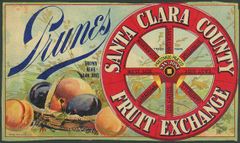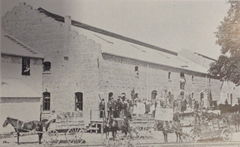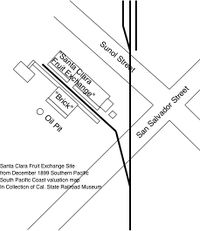Difference between revisions of "Santa Clara County Fruit Exchange"
(initial import) |
|||
| (30 intermediate revisions by the same user not shown) | |||
| Line 1: | Line 1: | ||
| − | {{ | + | {{Infobox_Industry |
| − | | | + | | primary_business = Dried Fruit Packer, Cooperative |
| − | | | + | | primary_town = San Jose |
| − | + | | primary_dates = 1892-1916 | |
| − | + | | predecessors = [[West Side Fruit Growers Association]], [[East Side Fruit Growers Union]], [[Berryessa Fruit Growers Union]], [[Campbell Fruit Growers Union]] | |
| − | | | ||
| − | | | ||
}} | }} | ||
| − | == | + | [[File:Fruit_exchange_label.jpg | 240px|thumb|right| Label from Santa Clara County Fruit Exchange]] |
| + | |||
| + | The '''Santa Clara County Fruit Exchange''' was a San Jose-based growers cooperative, started by [[Colonel Philo Hersey]] in 1892<ref>[http://books.google.com/books?id=hLtBAQAAIAAJ&lpg=PA224&ots=T71blouY_G&dq=%22berryessa%20fruit%20growers%20union%22&pg=PA224#v=onepage&q=%22berryessa%20fruit%20growers%20union%22&f=false California State Board of Agriculture report in 1894] </ref><ref>[http://cdnc.ucr.edu/cdnc/cgi-bin/cdnc?a=d&d=PRP18920716&cl=CL1%2ePRP&e=-------en--20--1--txt-IN-----# July 16, 1892 Pacific Rural Press ] mentions the founding of the company, as well as the plans for a two story fireproof building.</ref>. The Santa Clara Valley Fruit Exchange was the first cooperative dried fruit marketing association in the Santa Clara Valley and was particularly long-lived, lasting from 1892 to nearly the dawn of the [[California Prune and Apricot Growers]] (Sunsweet). The fruit exchange also swallowed up several other co-ops, including the [[East Side Fruit Growers Union]], [[West Side Fruit Growers Association]], [[Berryessa Fruit Growers Union]], and [[Campbell Fruit Growers Union]]. The Fruit Exchange also banded together with other co-ops to form a common sales agency called the [[California Fruit Association]]<ref>[http://books.google.com/books?id=pDRPAAAAIAAJ&lpg=PA33&ots=g3FVuJ-pHB&dq=%22santa%20clara%20county%20fruit%20union%22&pg=PA34#v=onepage&q=%22santa%20clara%20county%20fruit%20union%22&f=false history of cooperatives]</ref>. | ||
| + | Directors in 1902 included include [[Colonel Philo Hersey]], C.F. Weyman, Noah G. Rogers, F.H. Babb, [[Charles Wesley Childs]], G.C. Grant, H.A. Bailey, O.H. Shelley, and J.A. Wetmore<ref>[http://news.google.com/newspapers?id=wysiAAAAIBAJ&sjid=OKQFAAAAIBAJ&dq=santa-clara-county-fruit-exchange&pg=4130%2C4475589 May 3, 1902 San Jose Evening News] article on annual meeting in the warehouse on Sunol St.</ref>. | ||
| + | |||
| + | [[File:Santa_clara_valley_fruit_exchange.jpg | 240px|thumb|right| Santa Clara Valley Fruit Exchange building, mid-1890's]] | ||
| + | The organization ceased operations in 1911<ref>Philo Hersey, Santa Clara County Fruit Exchange. In [http://books.google.com/books?id=DL9UAAAAYAAJ&lpg=PA177&ots=Vd-bs6qxai&dq=%22stewart%20fruit%22%20w.h.%20stewart&pg=PA197#v=onepage&q=%22stewart%20fruit%22%20w.h.%20stewart&f=false U.S. Department of Agriculture Report #98: Systems of Marketing Farm Products and Demand for Such Products at Trade Centers], 1913. "The Santa Clara County Fruit Exchange has been out of business for two years. Our method when in active business was to appoint agents in all important distributing locations in this country and Europe and have them solicit orders for our approval. This method was very satisfactory for those of us who had the business in hand."</ref>, then disbanded in 1916 because of various problems, including farmers selling outside the co-op<ref>[http://news.google.com/newspapers?id=UBlKAAAAIBAJ&sjid=LyENAAAAIBAJ&dq=santa-clara-county-fruit-exchange&pg=2343%2C2726120 June 15, 1923 Evening News ]: article on why exchange failed</ref><ref>Jacobson, "Passing Farms". Notes Olson family members claiming members sold outside the co-op.</ref>. The Sunsweet Story states the Exchange didn't require anyone to sell to them, and growers were alternately annoyed when the co-op didn't sell fruit immediately so they could get cash, and the next season annoyed because the co-op didn't hold on to fruit to get a higher price. Hersey described it as "This high average price was not satisfactory to our members, however, because they did not get the highest price paid anyone acting independently during the season." | ||
| + | |||
| + | The Fruit Exchange shipped significant amounts of fruit - 140 cars to Philadelphia alone in 1900<ref>[http://news.google.com/newspapers?id=ZepTAAAAIBAJ&sjid=BzkNAAAAIBAJ&dq=santa-clara-county-fruit-exchange&pg=2462%2C212950 Philadelphia Record of December 25, 1900]</ref> | ||
| + | |||
| + | The Fruit Exchange also was memorable for its well-built, fireproof packing house on Sunol Street opposite what later became Del Monte's cannery. The plant was built around 1893<ref>March 16, 1893 San Jose Evening News. "The Santa Clara County Fruit Exchange has bought of J. M. Bettee 5 acres bounded by Sansevain and Sunol streets and the narrow gauge railroad. This location is one block from the site where the San Jose Fruit Packing Company is erecting its new buildings, and believed to be the most convenient available location for the majority of the orchardists of the county."</ref> The large two-story brick structure, regardless of its fireproof design, burned in 1915 while leased to [[Rosenberg Brothers]]. | ||
| + | |||
| + | In 1899, the plant was actually a collection of several buildings: two warehouses with loading docks along Sunol Street with a railroad spur west of the buildings, then a brick warehouse to the west of those buildings across the tracks. A separate building to the northwest was joined to the cluster of buildings a a loading dock. An accessory structure was to the south, between the spur and South Pacific Coast mainline<ref>Southern Packing Railroad, San Jose: South Pacific Coast, December 1899. Railroad valuation map showing track between San Carlos Street and San Salvador Street. In collection of California State Railroad Museum.</ref>. | ||
| + | |||
| + | The packing house burned to the ground on August 4, 1915<ref>[http://news.google.com/newspapers?id=63IzAAAAIBAJ&sjid=Z-MFAAAAIBAJ&pg=1330%2C1450064 August 7, 1915 San Jose Evening News] report on fire in 1915</ref>. It had been rented by [[Rosenberg Brothers]]. Parts of the site had already been sold to the San Jose Los Gatos Interurban Railroad in 1905<ref>San Jose City Council ruling on redevelopment of land: [http://www3.sanjoseca.gov/clerk/ORDS_RESOS/ORD_28849.pdf Ordinance 28849]. One of the property descriptions notes that part of the land was sold in December 1905 for the Car Barn for the interurban.</ref>. | ||
| + | |||
| + | The July 19, 1900 San Jose Evening News mentions safe-cracking at Standard Oil, "behind the warehouse of the Santa Clara County Fruit Exchange". | ||
| + | |||
| + | The Exchange was one of the fruit drop-off locations for the [[California Cured Fruit Association]] in 1900. | ||
==Locations== | ==Locations== | ||
| + | [[File: Santa_clara_fruit_exchange_map.jpeg|200px|thumb|right|Map of Santa Clara Fruit Exchange site, 1899]] | ||
{| class="wikitable" | {| class="wikitable" | ||
|- | |- | ||
! Location !! Years !! Address !! Details | ! Location !! Years !! Address !! Details | ||
|- | |- | ||
| − | | Los Gatos || | + | | Los Gatos || ? || || |
| − | |||
| − | |||
|- | |- | ||
| − | | | + | | Mountain View || ? || || |
|- | |- | ||
| − | | San Jose || 1896 - 1907 || [http://maps.google.com/maps?q=Sunol%20Street%20north%20of%20Auzerais%20Street,San%20Jose Sunol Street north of Auzerais Street] || | + | | San Jose || 1896 - 1907 || [http://maps.google.com/maps?q=Sunol%20Street%20north%20of%20Auzerais%20Street,San%20Jose Sunol Street north of Auzerais Street] || 60 x 150 foot brick warehouse |
|- | |- | ||
| Santa Clara || 1900 || || | | Santa Clara || 1900 || || | ||
|- | |- | ||
| − | | Saratoga || | + | | Saratoga || ? || || |
|- | |- | ||
|} | |} | ||
==Photos== | ==Photos== | ||
| − | |||
| − | |||
| − | |||
| − | + | ==References== | |
| − | + | <references/> | |
| − | |||
| − | |||
| − | |||
| − | |||
| − | |||
| − | |||
| − | |||
| − | |||
| − | |||
| − | |||
| − | |||
| − | |||
| − | |||
| − | |||
| − | |||
| − | |||
| − | |||
| − | |||
| − | |||
| − | |||
| − | |||
| − | |||
| − | |||
[[Category:Los Gatos]] | [[Category:Los Gatos]] | ||
[[Category:Mountain View]] | [[Category:Mountain View]] | ||
| Line 64: | Line 53: | ||
[[Category:Saratoga]] | [[Category:Saratoga]] | ||
[[Category:Dried Fruit Packer]] | [[Category:Dried Fruit Packer]] | ||
| − | [[Category: | + | [[Category: Cooperative]] |
| + | |||
| + | [[Category:West San Jose]] | ||
Latest revision as of 18:54, 13 May 2017
| Business |
Dried Fruit Packer, Cooperative |
|---|---|
| Main Location |
San Jose |
| Active |
1892-1916 |
| Predecessors |
West Side Fruit Growers Association, East Side Fruit Growers Union, Berryessa Fruit Growers Union, Campbell Fruit Growers Union |
The Santa Clara County Fruit Exchange was a San Jose-based growers cooperative, started by Colonel Philo Hersey in 1892[1][2]. The Santa Clara Valley Fruit Exchange was the first cooperative dried fruit marketing association in the Santa Clara Valley and was particularly long-lived, lasting from 1892 to nearly the dawn of the California Prune and Apricot Growers (Sunsweet). The fruit exchange also swallowed up several other co-ops, including the East Side Fruit Growers Union, West Side Fruit Growers Association, Berryessa Fruit Growers Union, and Campbell Fruit Growers Union. The Fruit Exchange also banded together with other co-ops to form a common sales agency called the California Fruit Association[3]. Directors in 1902 included include Colonel Philo Hersey, C.F. Weyman, Noah G. Rogers, F.H. Babb, Charles Wesley Childs, G.C. Grant, H.A. Bailey, O.H. Shelley, and J.A. Wetmore[4].
The organization ceased operations in 1911[5], then disbanded in 1916 because of various problems, including farmers selling outside the co-op[6][7]. The Sunsweet Story states the Exchange didn't require anyone to sell to them, and growers were alternately annoyed when the co-op didn't sell fruit immediately so they could get cash, and the next season annoyed because the co-op didn't hold on to fruit to get a higher price. Hersey described it as "This high average price was not satisfactory to our members, however, because they did not get the highest price paid anyone acting independently during the season."
The Fruit Exchange shipped significant amounts of fruit - 140 cars to Philadelphia alone in 1900[8]
The Fruit Exchange also was memorable for its well-built, fireproof packing house on Sunol Street opposite what later became Del Monte's cannery. The plant was built around 1893[9] The large two-story brick structure, regardless of its fireproof design, burned in 1915 while leased to Rosenberg Brothers.
In 1899, the plant was actually a collection of several buildings: two warehouses with loading docks along Sunol Street with a railroad spur west of the buildings, then a brick warehouse to the west of those buildings across the tracks. A separate building to the northwest was joined to the cluster of buildings a a loading dock. An accessory structure was to the south, between the spur and South Pacific Coast mainline[10].
The packing house burned to the ground on August 4, 1915[11]. It had been rented by Rosenberg Brothers. Parts of the site had already been sold to the San Jose Los Gatos Interurban Railroad in 1905[12].
The July 19, 1900 San Jose Evening News mentions safe-cracking at Standard Oil, "behind the warehouse of the Santa Clara County Fruit Exchange".
The Exchange was one of the fruit drop-off locations for the California Cured Fruit Association in 1900.
Locations
| Location | Years | Address | Details |
|---|---|---|---|
| Los Gatos | ? | ||
| Mountain View | ? | ||
| San Jose | 1896 - 1907 | Sunol Street north of Auzerais Street | 60 x 150 foot brick warehouse |
| Santa Clara | 1900 | ||
| Saratoga | ? |
Photos
References
- ↑ California State Board of Agriculture report in 1894
- ↑ July 16, 1892 Pacific Rural Press mentions the founding of the company, as well as the plans for a two story fireproof building.
- ↑ history of cooperatives
- ↑ May 3, 1902 San Jose Evening News article on annual meeting in the warehouse on Sunol St.
- ↑ Philo Hersey, Santa Clara County Fruit Exchange. In U.S. Department of Agriculture Report #98: Systems of Marketing Farm Products and Demand for Such Products at Trade Centers, 1913. "The Santa Clara County Fruit Exchange has been out of business for two years. Our method when in active business was to appoint agents in all important distributing locations in this country and Europe and have them solicit orders for our approval. This method was very satisfactory for those of us who had the business in hand."
- ↑ June 15, 1923 Evening News : article on why exchange failed
- ↑ Jacobson, "Passing Farms". Notes Olson family members claiming members sold outside the co-op.
- ↑ Philadelphia Record of December 25, 1900
- ↑ March 16, 1893 San Jose Evening News. "The Santa Clara County Fruit Exchange has bought of J. M. Bettee 5 acres bounded by Sansevain and Sunol streets and the narrow gauge railroad. This location is one block from the site where the San Jose Fruit Packing Company is erecting its new buildings, and believed to be the most convenient available location for the majority of the orchardists of the county."
- ↑ Southern Packing Railroad, San Jose: South Pacific Coast, December 1899. Railroad valuation map showing track between San Carlos Street and San Salvador Street. In collection of California State Railroad Museum.
- ↑ August 7, 1915 San Jose Evening News report on fire in 1915
- ↑ San Jose City Council ruling on redevelopment of land: Ordinance 28849. One of the property descriptions notes that part of the land was sold in December 1905 for the Car Barn for the interurban.


